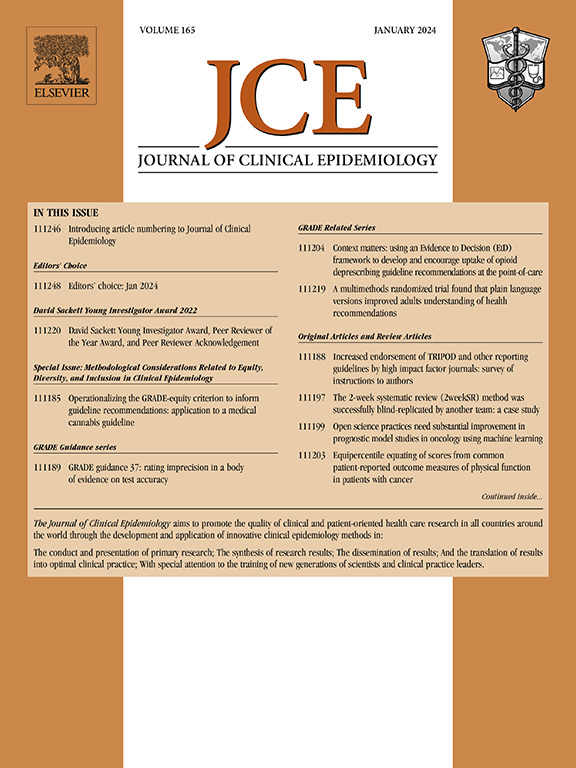以系统综述中的种族健康公平为中心--论文 1:系列介绍。
IF 7.3
2区 医学
Q1 HEALTH CARE SCIENCES & SERVICES
引用次数: 0
摘要
目的:系统性综述作为强调循证实践的工具,在减少或消除种族健康差异方面大有可为。目前,在系统综述和其他证据综合产品中,以种族健康公平为中心还缺乏共识。以种族健康公平为中心意味着集中或重点关注健康公平,关注通常被边缘化的群体的观点或需求:该 Cochrane 美国网络团队及其同事在指导委员会的指导下,通过半结构式访谈了解不同利益相关者的观点,并针对以下方面进行了证据综述:(1)种族健康公平的定义;(2)以种族健康公平为中心的逻辑模型和框架;(3)减少种族健康不公平的干预措施;(4)利益相关者参与证据综述。我们的方法和团队主要从美国和加拿大的视角进行研究;然而,从这项工作中得出的发现和见解适用于任何存在种族或民族歧视以及因结构性原因造成的医疗差距的地区:在本系列文章中,我们解释了以种族健康公平为中心为何重要、存在哪些差距以及可能需要优先考虑的问题。访谈和系统性综述发现了解决种族健康公平问题的许多差距,这些差距不仅需要改变证据综合实践,还需要改变基本的证据生态系统。这些变化包括增加代表性、建立基础性指导(关于定义、因果机制和模型、建立种族健康公平的实质性证据基础、加强方法指导、传播和实施结果,以及维持新的实践):以种族健康公平为中心需要主要利益相关者达成共识。作为建立共识的下一步工作的一部分,需要对本系列文件所指出的多方面差距进行优先排序。鉴于资源有限,当以证据为基础的成功标准得到明确确立,以种族健康公平为中心的益处显而易见时,最有可能改变围绕系统性审查的规范。本文章由计算机程序翻译,如有差异,请以英文原文为准。
Centering racial health equity in systematic reviews—paper 1: introduction to the series
Objectives
Systematic reviews hold immense promise as tools to highlight evidence-based practices that can reduce or aim to eliminate racial health disparities. Currently, consensus on centering racial health equity in systematic reviews and other evidence synthesis products is lacking. Centering racial health equity implies concentrating or focusing attention on health equity in ways that bring attention to the perspectives or needs of groups that are typically marginalized.
Study Design and Setting
This Cochrane US Network team and colleagues, with the guidance of a steering committee, sought to understand the views of varied interest holders through semistructured interviews and conducted evidence syntheses addressing (1) definitions of racial health equity, (2) logic models and frameworks to centering racial health equity, (3) interventions to reduce racial health inequities, and (4) interest holder engagement in evidence syntheses. Our methods and teams include a primarily American and Canadian lens; however, findings and insights derived from this work are applicable to any region in which racial or ethnic discrimination and disparities in care due to structural causes exist.
Results
In this series, we explain why centering racial health equity matters and what gaps exist and may need to be prioritized. The interviews and systematic reviews identified numerous gaps to address racial health equity that require changes not merely to evidence synthesis practices but also to the underlying evidence ecosystem. These changes include increasing representation, establishing foundational guidance (on definitions and causal mechanisms and models, building a substantive evidence base on racial health equity, strengthening methods guidance, disseminating and implementing results, and sustaining new practices).
Conclusion
Centering racial health equity requires consensus on the part of key interest holders. As part of the next steps in building consensus, the manifold gaps identified by this series of papers need to be prioritized. Given the resource constraints, changes in norms around systematic reviews are most likely to occur when evidence-based standards for success are clearly established and the benefits of centering racial health equity are apparent.
Plain Language Summary
Racial categories are not based on biology, but racism has negative biological effects. People from racial or ethnic minority groups have often been left out of research and ignored in systematic reviews. Systematic reviews often help clinicians and policymakers with evidence-based decisions. Centering racial health equity in systematic reviews will help clinicians and policymakers to improve outcomes for people from racial or ethnic minority groups. We conducted interviews and a series of four systematic reviews on definitions, logic models and frameworks, methods, interventions, and interest-holder engagement in syntheses. We found that much work remains to be done in centering racial health equity in systematic reviews. Specifically, systematic reviewers need to change who is represented on their teams, establish foundational guidance (on definitions and causal mechanisms and models, identify what interventions work to address racial health equity, strengthen method guidance, disseminate and implement results, and sustain new practices).
求助全文
通过发布文献求助,成功后即可免费获取论文全文。
去求助
来源期刊

Journal of Clinical Epidemiology
医学-公共卫生、环境卫生与职业卫生
CiteScore
12.00
自引率
6.90%
发文量
320
审稿时长
44 days
期刊介绍:
The Journal of Clinical Epidemiology strives to enhance the quality of clinical and patient-oriented healthcare research by advancing and applying innovative methods in conducting, presenting, synthesizing, disseminating, and translating research results into optimal clinical practice. Special emphasis is placed on training new generations of scientists and clinical practice leaders.
 求助内容:
求助内容: 应助结果提醒方式:
应助结果提醒方式:


